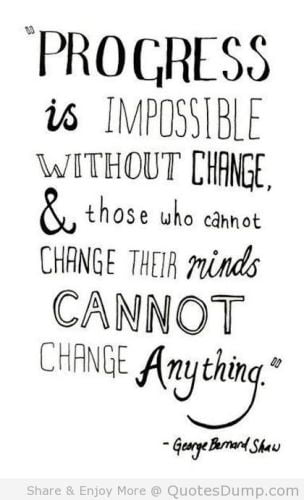 If you're the type of person who's interested in personal or spiritual growth (and probably you are because you're reading this blog!) then there's often comes a point when you wonder, "Am I making progress? Is my life any different this year than it was the last?"
If you're the type of person who's interested in personal or spiritual growth (and probably you are because you're reading this blog!) then there's often comes a point when you wonder, "Am I making progress? Is my life any different this year than it was the last?"
It's hard to know sometimes, of course-- self-improvements are objective.
This Lent at The Federated Church, a small group of us studied a book I found particularly helpful on this topic called, A Clearing Season by Sarah Parsons.
Within the chapter, "New Growth" Parsons gives 4 ways we can know that new growth is happening in our lives.
She exhorts us: "As we open ourselves by successfully clearing space in our lives, creativity energy flows more easily. . . . My own creative impulses are as small as a desire to cook dinner . . ."
So many of us think of creativity as something "those kinds" of people do. Not us. We say "I can't sew. I can't draw. We can't arrange flowers." And because of these things we assume that we're not creative. But Parsons points out here with her cooking dinner example that all of us can create something.
Woodwork, gardening, painting, writing, dancing and the list could go on and on. I've heard it said that the greatest enemy to creativity is comparison. So who cares that you're not a rock star?
Parson writes, "As we grow spiritually and new life springs up in us, we discover that we have more love to give, and we feel more confident in our giving."
It's so easy to believe in a world of scarcity, to believe that there's not a enough love to go around. But when we are spiritually open, Parson says, we approach life with the freedom of loving lavishly. We tell people how we feel about them. We open our heart to new members of our social circles. We make time for the most important moments of life. We love without strings attached!
Parson says, "A willingness to be surprised is a matter of trust in God, of trusting that somehow God's surprises are always good."
Each new day IS an invitation to surprise. Even if we think our day is planned from the moment our feet hit the floor, there's always the possibility of factors we cannot control. And aren't surprises are the best? A conversation that lingers long. An encouraging card in the mail. A tasty meal. A glorious sunset. A chance to see the Big Dipper in the night sky.
Openness to God is always about the possibility of what the Divine could only orchestrate for our days. And aren't the words of Isaiah 43:19 so wonderful when God says to us, "I am about to do a new thing; now that it springs forth, do you not perceive it?"
Consider this, "Most people" Parson writes, "can recall an experience of being vulnerable that left them hurt, and we can start to think that our vulnerability was the problem. If we just avoid showing our weakness, we can avoid all hurt in the future. But Paul offers us the opposite lesson, 'I will boast all the more gladly in my weakness, so that the power of Christ may dwell in me." (1 Cor. 12:9)
Or, otherwise known as speaking our truth. A warning here: not everyone can handle our vulnerability (and not everyone has earned the right to hear our stories as Brene Brown would say). But there are some gems of people who can. Through them, we receive the blessings like compassion and forgiveness.
So are you getting somewhere? I bet you are!
Many of us can be so HARD on ourselves. We don't celebrate that we've moved an inch when we've think we should have moved mile! As an aside, a dear friend of mine frequently tells me when I start complaining like this, "Don't should all over yourself." And it's so true!
Here's your homework: take a walk alone. Sit quietly for a few extra minutes in the morning. Sit outside in a beautiful place. Be still and know God. And the rest will come!
 Several years ago I heard a tv special in which TV actress Jane Fonda said this about life: "We are not meant to be perfect. We are meant to be whole."
Several years ago I heard a tv special in which TV actress Jane Fonda said this about life: "We are not meant to be perfect. We are meant to be whole."
Hearing it was one of those stop me in my tracks kind of moments because what truth!
And being whole is not about: "Bam! Now I've got my stuff together" but rather a really long journey. In my faith tradition, we call this spiritual formation.
Yet, how much of our lives do we live striving for perfection?
A diet the starves us. A succession plan at work that enslaves us. And, keeping a pristine yard that exhausts us. 
And not only this. Some of us won't go out of our house without our make-up.
We don't say what is troubling us in the church prayer request time or even around the table at lunch with girlfriends.
And as a result, sure, we might look good in public and be the envy of others for our wonderful lives. But, perfectionism costs us something. Here are 4 things:
I can smell a fake 50 feet away, can't you? I don't respect (or follow for that matter) people who aren't telling the truth.
Fakers are not those who make it to the top in the very end.
Fakers are not the friends you call in the middle of the night when you need a friend. Fakers are not the ones who are cared for in community when life hits it most rocky patches.
In the race toward perfection we begin to "see ourselves more highly than we ought" as Paul warns against in the book of Romans.
You know those perfect friends of yours who always have the best plan for how to make their spouse do exactly what they want to do on Friday night, or how to start potty training their child at 18 months old, or who achieve the highest percentage of weight loss in only a month?
And what is worse is they don't even see it.
Sure, there are times when out of the norm things happen that are wonderful, but to be human is to NOT have your surroundings exactly aligned as if we were in charge of our own universe. We all have bad luck sometimes.
Those who are in the rat race to be perfect, often don't have the time for others. These folks don't have time to stop and help a co-worker.
They don't have time to consider the recent losses experienced by a friend.
Friends like this don't have time to simply sit with a person through long-term crisis.
Why?
Because all of these things slow a perfectionist seeker down.
And not only this, I don't know how many times that people have said to me as a pastor, "I'd wish could help ____ who needs help but I can't. I'm not sure I would know what to say or do." Perfectionism often paralyzes us from what could be human to human encounters of love.
Brene Brown has become the queen of talks about vulnerability. Her book The Gift of Imperfection became a national best seller (if that tells you anything about American culture and what we most crave).
She says this about vulnerabilities' gifts for us: “Owning our story can be hard but not nearly as difficult as spending our lives running from it.
Embracing our vulnerabilities is risky but not nearly as dangerous as giving up on love and belonging and joy—the experiences that make us the most vulnerable.
Only when we are brave enough to explore the darkness will we discover the infinite power of our light.”
Show more of your warts today!